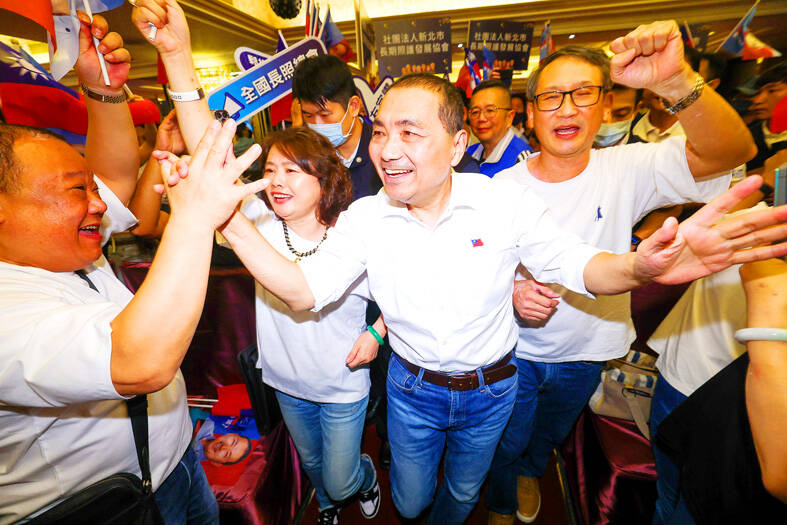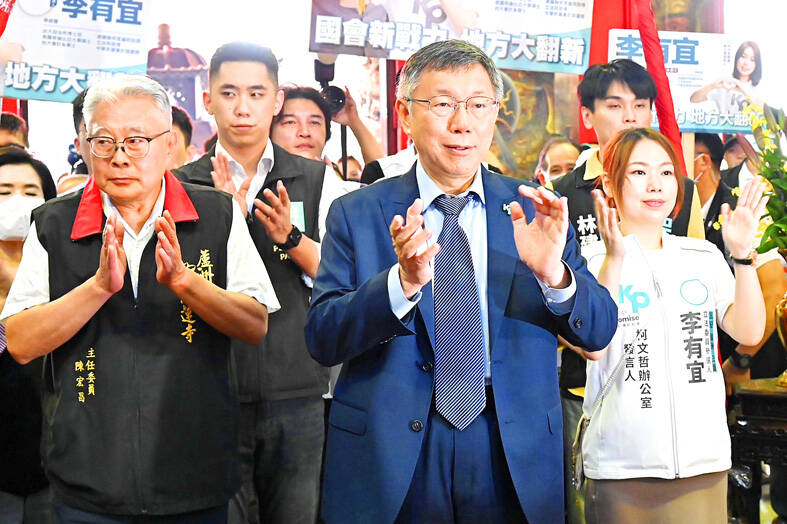The presidential candidates from the two main opposition parties convened on Tuesday in a bid to break the deadlock and work out a deal for January’s election, but failed to agree on the details of a proposed joint presidential ticket.
The Chinese Nationalist Party’s (KMT) presidential candidate, New Taipei City Mayor Hou You-yi (侯友宜), and KMT Chairman Eric Chu (朱立倫) met with Taiwan People’s Party (TPP) presidential candidate and Chairman Ko Wen-je (柯文哲) in Taipei in the evening.
The meeting, which lasted about 53 minutes, was held after limited progress had been made by the two parties to forge a partnership that could take on Vice President William Lai (賴清德), the Democratic Progressive Party’s (DPP) candidate in the Jan. 13 election.

Photo: CNA
TPP spokesperson Christina Yang (楊寶楨) told a news conference yesterday that the two sides had failed to reach an agreement on how candidates would be selected in a potential alliance.
The KMT has proposed an open primary, while the TPP has suggested national polls to determine how Hou and Ko would be paired.
“The problem [of the ongoing stalemate] is that Hou is against conducting polls, but Ko has made it clear that it is too late to hold an open primary,” Yang said.

Photo: Tu Chien-jung, Taipei Times
Ko is optimistic that Chu will come up with a new plan, she added.
However, if he fails to do so, “a future meeting may be rendered unnecessary,” she said.
Ko also addressed the situation at another news conference yesterday.
He said that he does not need to be the presidential candidate on the joint ticket, but that he does insist on fair rules and competition in the process of deciding who would be.
Chu separately told reporters that both parties should contemplate how a workable plan could look, adding that he would draw on examples of cooperation among opposition figures in other countries.
Meanwhile, the DPP said that Ko had not adhered to his proclaimed commitment to “openness and transparency.”
DPP spokesman Chang Chih-hao (張志豪) in a press release urged the trio to offer a comprehensive explanation regarding the meeting.
The meeting appeared not only to be solely focused on behind-the-scenes political negotiations, but also involved discussions on how to smear and attack the DPP, Chang said.

Chinese spouse and influencer Guan Guan’s (關關) residency permit has been revoked for repeatedly posting pro-China videos that threaten national security, the National Immigration Agency confirmed today. Guan Guan has said many controversial statements in her videos posted to Douyin (抖音), including “the red flag will soon be painted all over Taiwan” and “Taiwan is an inseparable part of China,” and expressing hope for expedited reunification. The agency last year received multiple reports alleging that Guan Guan had advocated for armed reunification. After verifying the reports, the agency last month issued a notice requiring her to appear and explain her actions. Guan

GIVE AND TAKE: Blood demand continues to rise each year, while fewer young donors are available due to the nation’s falling birthrate, a doctor said Blood donors can redeem points earned from donations to obtain limited edition Formosan black bear travel mugs, the Kaohsiung Blood Center said yesterday, as it announced a goal of stocking 20,000 units of blood prior to the Lunar New Year. The last month of the lunar year is National Blood Donation Month, when local centers seek to stockpile blood for use during the Lunar New Year holiday. The blood demand in southern Taiwan — including Tainan and Kaohsiung, as well as Chiayi, Pingtung, Penghu and Taitung counties — is about 2,000 units per day, the center said. The donation campaign aims to boost

The Kaohsiung Tourism Bureau audited six hotels in an effort to prevent price gouging ahead of Korean band BTS’ concert tour in the city scheduled for Nov. 19, 21 and 22 this year. The bureau on Friday said that the audits — conducted in response to allegations of unfair pricing posted on social media — found no wrongdoing. These establishments included the local branches of Chateau de Chine, Hotel Nikko, My Humble House, and Grand Hai Lai, it said, adding that the Consumer Protection Commission would have penalized price gougers had the accusations been substantiated. The bureau said the Tourism Development Act

BACK TO WINTER: A strong continental cold air mass would move south on Tuesday next week, bringing colder temperatures to northern and central Taiwan A tropical depression east of the Philippines could soon be upgraded to be the first tropical storm of this year, the Central Weather Administration (CWA) said yesterday, adding that the next cold air mass is forecast to arrive on Monday next week. CWA forecaster Cheng Jie-ren (鄭傑仁) said the first tropical depression of this year is over waters east of the Philippines, about 1,867km southeast of Oluanpi (鵝鑾鼻), and could strengthen into Tropical Storm Nokaen by early today. The system is moving slowly from northwest to north, and is expected to remain east of the Philippines with little chance of affecting Taiwan,